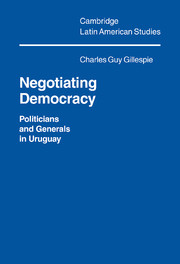Book contents
- Frontmatter
- Contents
- Foreword by Juan Linz
- Acknowledgments
- 1 Introduction: Political parties, theories of regime change, and the Uruguayan case
- PART I THE CRISIS AND SURVIVAL OF URUGUAYAN POLITICAL PARTIES
- PART II FROM AUTHORITARIAN CRISIS TO TRANSITION
- 5 Attempts at party renewal: from above and below
- 6 Party and military strategies in the “dialogue”: from partial opening to confrontation after the Parque Hotel talks
- 7 From mobilization to negotiation: the exhaustion of alternatives
- 8 The Naval Club pact: party and military strategies in the transition
- PART III POLITICAL PARTIES AND DEMOCRATIC CONSOLIDATION
- Conclusion: Parties and regime change – some lessons and comparisons
- Appendix
- Bibliography
- Index
- CAMBRIDGE LATIN AMERICAN STUDIES
7 - From mobilization to negotiation: the exhaustion of alternatives
Published online by Cambridge University Press: 11 September 2009
- Frontmatter
- Contents
- Foreword by Juan Linz
- Acknowledgments
- 1 Introduction: Political parties, theories of regime change, and the Uruguayan case
- PART I THE CRISIS AND SURVIVAL OF URUGUAYAN POLITICAL PARTIES
- PART II FROM AUTHORITARIAN CRISIS TO TRANSITION
- 5 Attempts at party renewal: from above and below
- 6 Party and military strategies in the “dialogue”: from partial opening to confrontation after the Parque Hotel talks
- 7 From mobilization to negotiation: the exhaustion of alternatives
- 8 The Naval Club pact: party and military strategies in the transition
- PART III POLITICAL PARTIES AND DEMOCRATIC CONSOLIDATION
- Conclusion: Parties and regime change – some lessons and comparisons
- Appendix
- Bibliography
- Index
- CAMBRIDGE LATIN AMERICAN STUDIES
Summary
In early January 1984 the minister of the interior, General Linares Brum, was asked point-blank by journalists whether or not the government would be handed back to politicians in 1985. His reply was somber:
That is a rather difficult question to answer. … People are full of fervor, and those who perhaps do not know what happened in 1973, or what happened before 1973, go to demonstrations. [It] is possible that there will be [violent] confrontations with those who do not agree with these demonstrations. … I would say that if this situation gets worse the consequences are unpredictable.
On 18 January, Montevideo was paralyzed by the first general strike since 1973, leading to the banning of the Plenario Intersindical de Trabajadores (PIT) and hurried legislation to regulate the right to strike. During an official visit to Brazil at the end of February, President Alvarez made a point of guaranteeing that a liberal type of democracy would not return.
Uruguay's political future hung in the balance. There were no real prospects for continuismo (continuation of the authoritarian regime in its current form), nor any immediate prospects for its overthrow (ruptura). However, the Wilsonistas still hoped for the possibility of “democratic rupture” without negotiations. There were also still some sectors of the military who thought it possible to reform the system, if necessary without the agreement of the politicians elected in the primaries. These were the options that were to be exhausted during the first six months of 1984.
- Type
- Chapter
- Information
- Negotiating DemocracyPoliticians and Generals in Uruguay, pp. 128 - 159Publisher: Cambridge University PressPrint publication year: 1991



